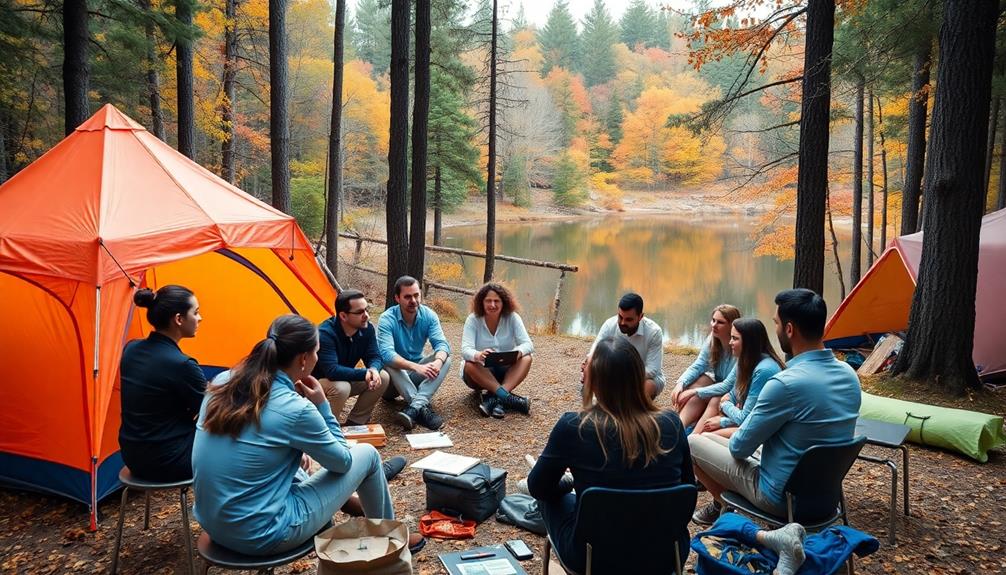To unlock your potential as a leader, explore unique retreat concepts that emphasize team-building and creativity. Participate in outdoor activities such as ropes courses or hiking to promote teamwork and trust. Include workshops that encourage innovative problem-solving to spark new ideas and challenge assumptions. Make sure to prioritize well-being by incorporating mindfulness sessions that encourage relaxation and strengthen team connections. Networking events can strengthen relationships by pairing experienced leaders with up-and-coming talents. Develop follow-up strategies for ongoing progress. By adopting these techniques, you will empower your team and foster a proactive leadership style. Discover more transformative ideas to enhance your retreats. Promote personal growth by integrating inspiring yoga retreat concepts that combine physical health with mental clarity, allowing team members to recharge and refocus. These activities can help reduce stress and boost resilience, creating a harmonious environment for leadership growth. Thoughtful planning for retreats can have long-lasting positive effects on individual and team performance. Additionally, incorporating relaxation-focused yoga retreat ideas can greatly support your team’s mental and physical well-being, establishing a foundation for sustained productivity. These retreats not only offer a break from the ordinary routine but also promote mindfulness practices that enhance focus and emotional intelligence. By including deliberate, rejuvenating experiences, you will establish a culture of equilibrium and resilience within your leadership structure.
Key Takeaways
- Incorporate outdoor adventure experiences to foster teamwork, communication, and trust among participants in a natural setting.
- Utilize innovative thinking workshops to stimulate creativity and challenge existing assumptions for fresh solutions to organizational challenges.
- Implement design thinking methodologies to address real-world problems and enhance collaboration while developing user-centric solutions.
- Engage in wellness and mindfulness strategies, such as yoga and meditation, to promote individual well-being and strengthen community bonds.
- Schedule regular reflection and feedback opportunities to foster continuous improvement and accountability within the team's leadership development journey.
Team-Building Activities
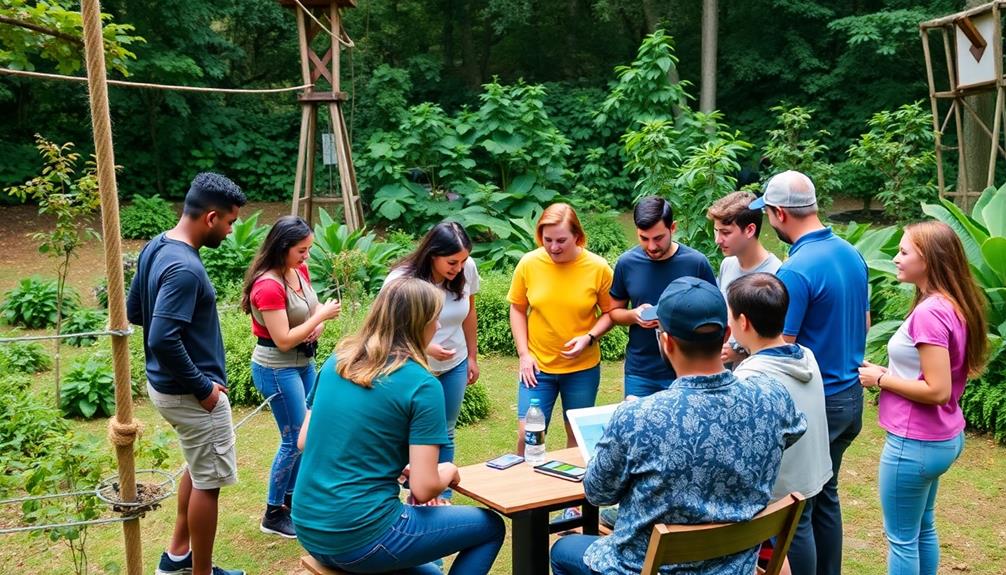
When you think about strengthening your team's dynamics, team-building activities are key. These activities foster trust, communication, and collaboration among your team members.
Engaging in problem-solving challenges or group exercises that require everyone to contribute their skills can be enhanced by incorporating elements from nature, such as diverse tent camping locations, which can help to refresh and inspire your team.
Outdoor adventures, like ropes courses or hiking, not only enhance teamwork but also promote physical health and participant engagement.
Creating a supportive environment where everyone feels valued is essential for unity and resilience. By sharing experiences through these activities, you can deepen connections and improve overall team effectiveness.
Incorporating fitness elements keeps energy levels high, making it a fun and engaging way to build stronger bonds within your team while enhancing their ability to work together effectively.
Creative Problem-Solving Techniques
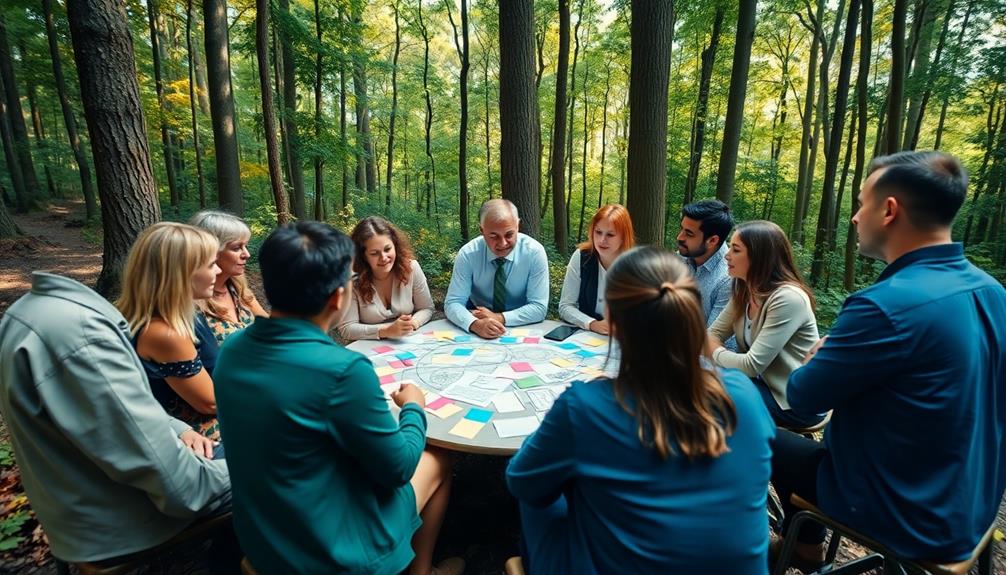
Building on the strong team dynamics established through team-building activities, creative problem-solving techniques can further enhance your team's ability to innovate and tackle challenges.
Encourage brainstorming sessions where everyone shares ideas freely, fostering a culture of open dialogue. Incorporating methods such as active listening can also guarantee that all voices are heard and valued.
Use design thinking methodologies to break free from conventional approaches, allowing your team to explore unconventional solutions. Challenge assumptions by presenting hypothetical scenarios that push boundaries and inspire fresh thinking.
Facilitate workshops focused on developing actionable plans for real challenges, emphasizing collaboration and diverse perspectives.
Outdoor Adventure Experiences
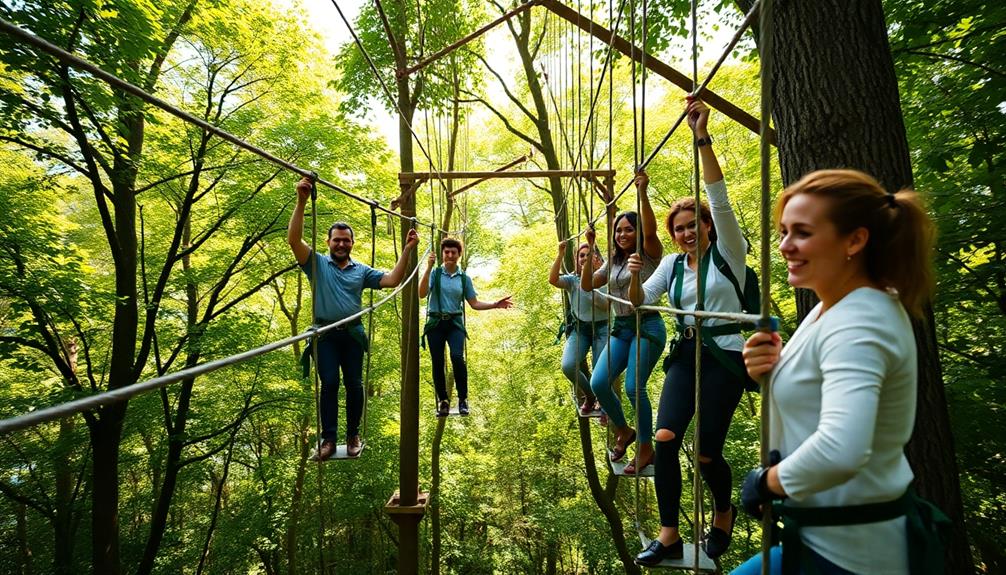
Outdoor adventure experiences can be a game-changer for team dynamics. Engaging in outdoor activities allows you and your team to break free from the usual office environment, fostering collaboration and trust.
These experiences challenge you to work together in innovative ways, enhancing communication and problem-solving skills.
- Tackle a ropes course that requires teamwork and strategy.
- Navigate through a wilderness survival challenge, relying on each other's strengths.
- Initiate a hiking expedition that encourages open dialogue and bonding.
Leadership Skills Development
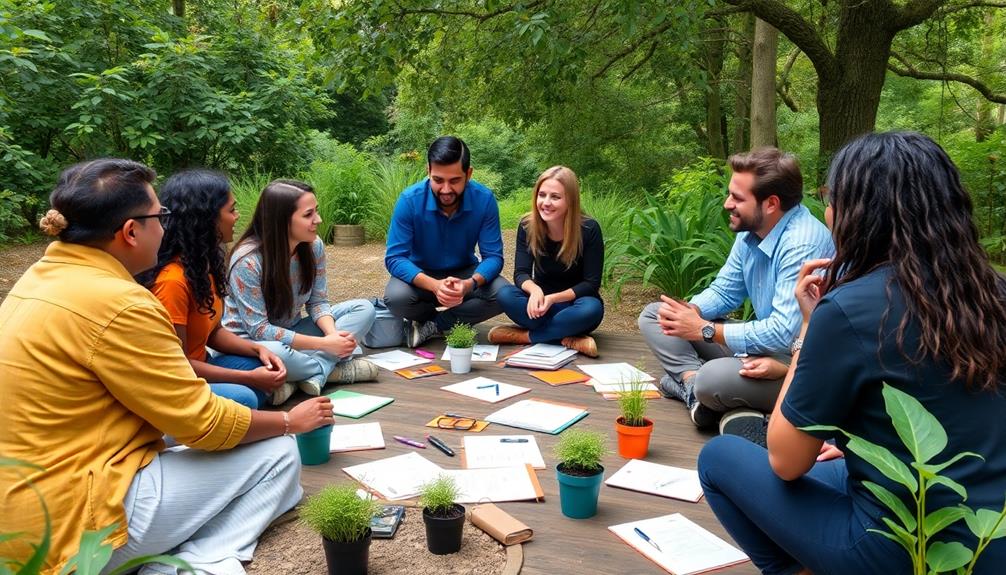
Effective leadership skills development is essential for any organization looking to thrive. By employing design thinking principles, leaders can foster a culture of innovation and adaptability within their teams.
You can enhance your leadership capabilities by participating in specialized workshops led by industry experts. Focus on mastering effective communication styles, conflict resolution, and negotiation techniques. These skills will empower you to make informed decisions and build valuable relationships.
Engage in real-world case studies to gain practical insights into adaptive leadership in various environments, while also exploring design thinking methodologies that can drive user-centric solutions. Networking opportunities during these sessions can further broaden your perspective, connecting you with peers facing similar challenges.
Wellness and Mindfulness Strategies
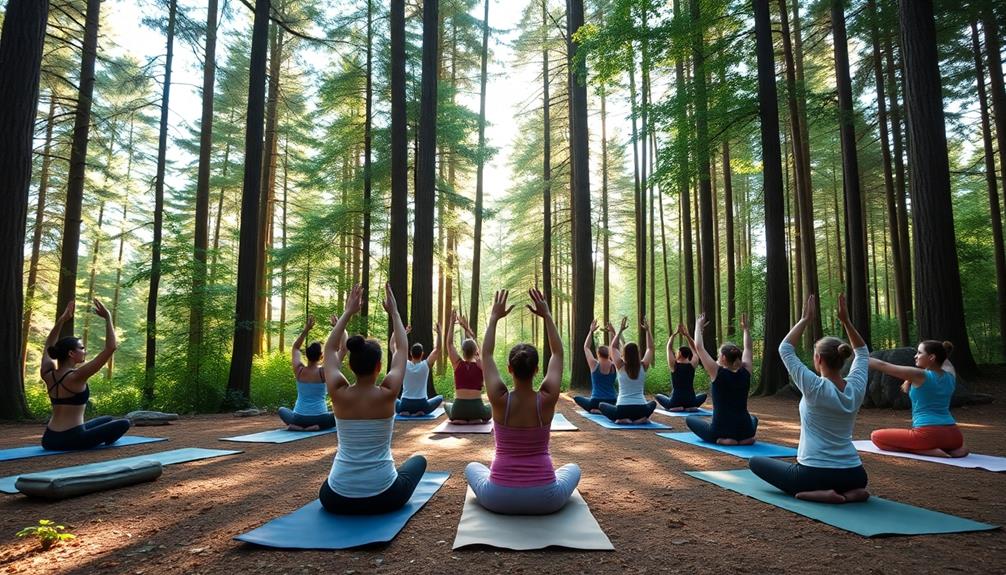
Your team's well-being plays an essential role in fostering a productive work environment. By integrating wellness and mindfulness strategies into your retreat, you can enhance mental clarity and emotional resilience.
Consider these practices:
- Guided meditation sessions to help participants center themselves and reduce stress.
- Yoga classes that promote physical well-being while encouraging relaxation and focus.
- Healthy meal planning workshops to equip your team with tools for nourishing their bodies and minds.
These strategies cultivate a positive atmosphere, supporting not just individual wellness but also strengthening community bonds among team members.
Reflection and Feedback Opportunities
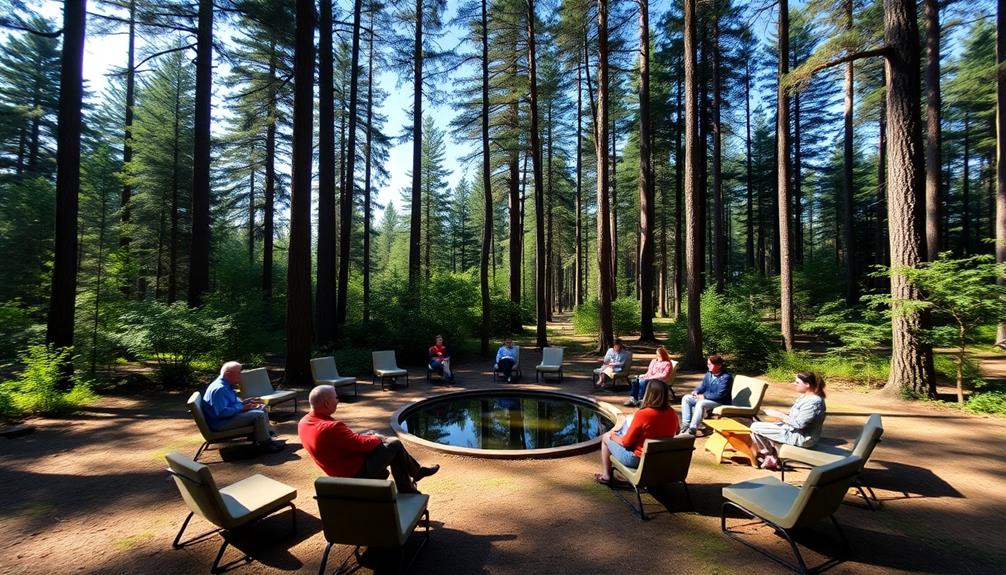
While it's essential to engage in team-building activities, reflecting on those experiences and gathering feedback can greatly enhance future retreats. These reflections provide valuable insights into what worked well and areas that could be improved, enabling future activities to be more targeted and effective. By actively seeking feedback from participants, organizations can implement changes that truly resonate with their teams and help revitalize team spirit for long-lasting cohesion. Ultimately, this process fosters an environment where collaboration and trust can flourish.
Encourage open dialogue among participants through anonymous surveys and group discussions. This will help you identify what worked well and what could improve.
Facilitate reflections on specific activities, allowing everyone to share insights and lessons learned. Creating actionable plans based on this feedback guarantees that you're continually evolving and addressing team needs.
By fostering a culture of continuous improvement, you empower your team to grow and adapt.
Remember, constructive feedback isn't just about criticism; it's a tool for enhancing future events and maintaining momentum within your leadership journey.
Embrace these opportunities to refine your approach and boost engagement.
Networking and Relationship Building
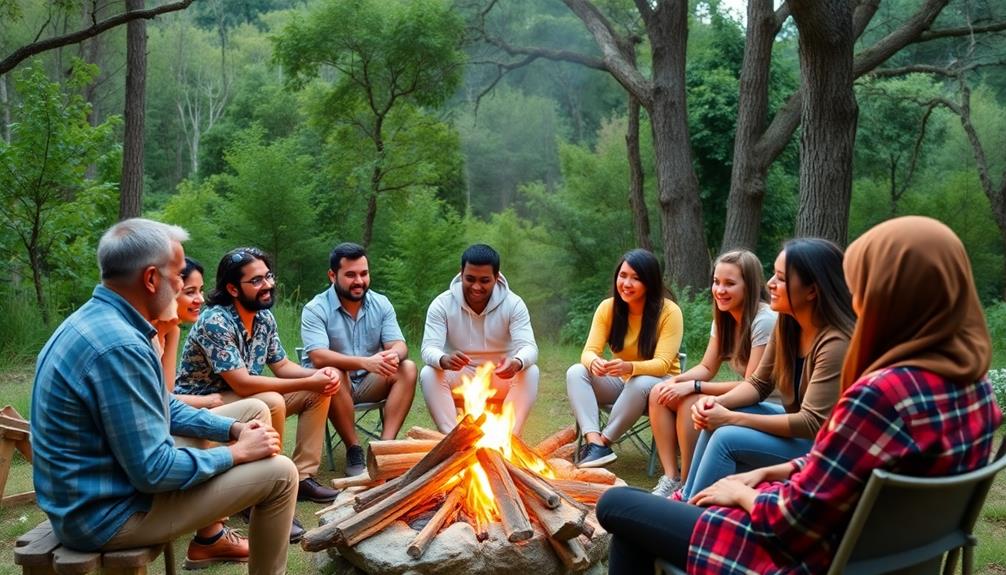
Building strong connections is a vital part of any leadership retreat, complementing the insights gained from reflection and feedback. Networking fosters collaboration and enhances team dynamics, making it essential for your growth as a leader.
To create meaningful relationships, consider these strategies:
- Structured Networking Sessions: Designate time for participants to connect and share insights, allowing for organic relationship-building.
- Icebreaker Activities: Use engaging games to ease initial interactions, helping everyone feel comfortable sharing experiences and best practices.
- Mentorship Opportunities: Pair experienced leaders with emerging talents, encouraging ongoing dialogue beyond the retreat.
Accountability and Follow-Up Plans
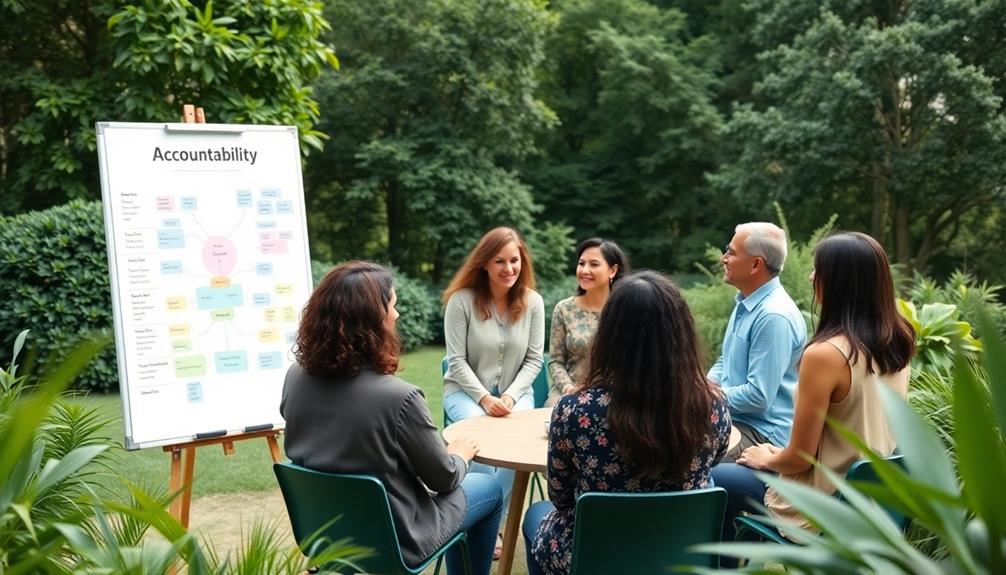
Establishing accountability and follow-up plans is essential for ensuring the skills learned during a leadership retreat stick. You should create actionable plans that outline how you'll implement the insights gained.
Schedule regular follow-up meetings to check in on progress and reinforce accountability. This keeps everyone focused and motivated to apply what they've learned.
Utilize online resources to support ongoing development, providing tools for continuous engagement. Encourage sharing successes and challenges within the group to foster a supportive environment.
Resilience Through Outdoor Challenges
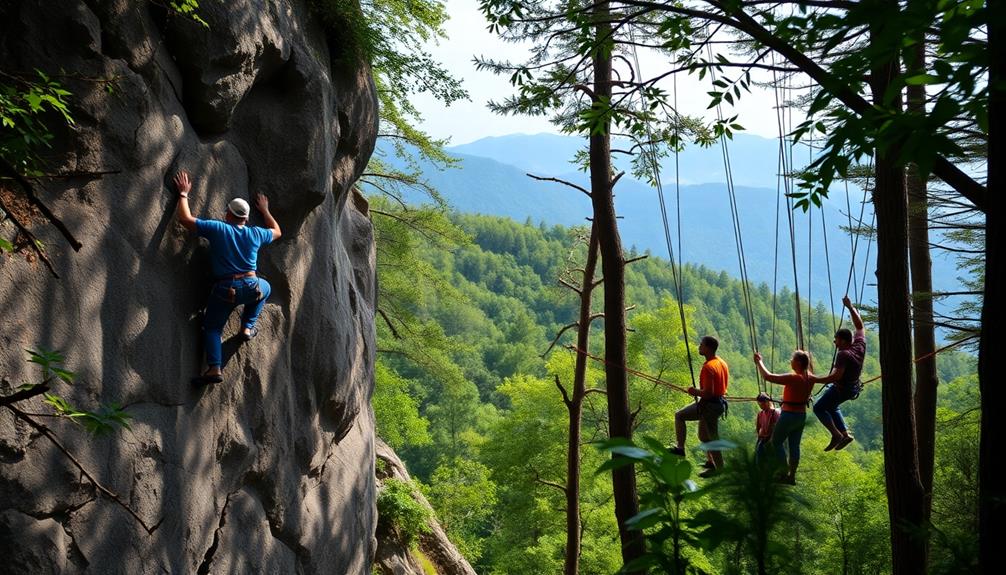
Outdoor challenges provide an excellent opportunity to cultivate resilience within your team. Engaging in these activities not only strengthens bonds but also teaches valuable lessons in adaptability and teamwork.
Incorporating elements of survival skills, such as those seen in primitive weapons for modern survival, can further enhance the experience by fostering creativity and resourcefulness. Embracing the great outdoors can lead to transformative experiences that enhance your team's performance.
- Hiking through rugged terrains challenges your team to navigate obstacles together, building trust and cooperation.
- Ropes courses push individuals out of their comfort zones, fostering courage and collaboration as they support one another.
- Survival tasks require quick problem-solving and resourcefulness, enhancing resilience in unpredictable situations.
Innovative Thinking Workshops
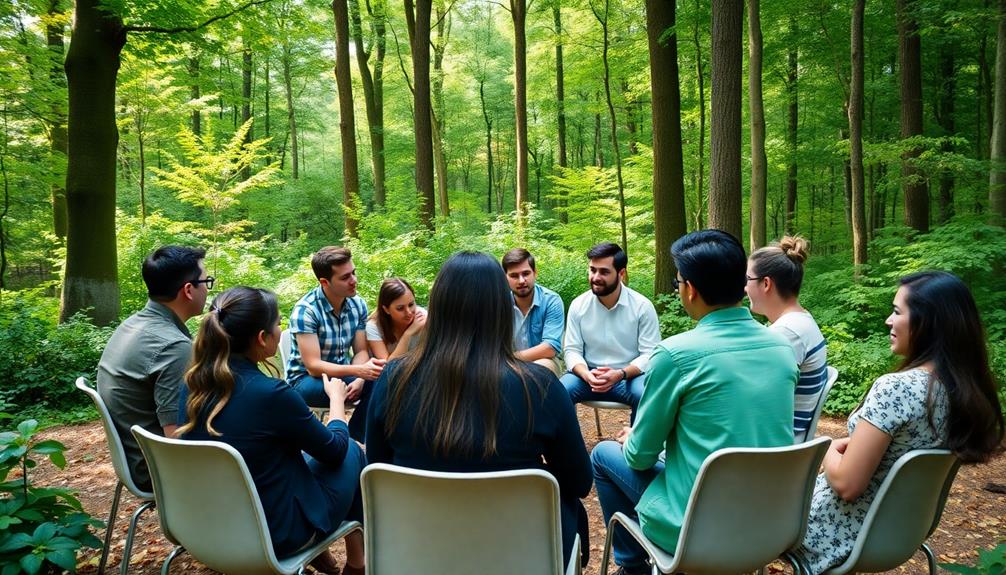
Engaging in outdoor challenges not only fosters resilience but also sets the stage for innovative thinking workshops that can elevate your team's creative potential.
These workshops encourage you to explore unconventional ideas and challenge existing assumptions. By facilitating dynamic brainstorming sessions, you'll create an environment where your team feels safe to experiment and think outside the box.
Utilize design thinking methodologies to tackle real challenges, transforming obstacles into actionable solutions. Encourage collaboration by integrating diverse perspectives, which sparks creativity and enhances problem-solving skills.
As a result, your team will cultivate a proactive approach to innovation, driving success in your organization. Make these workshops a cornerstone of your retreat to unleash untapped creative potential and foster a culture of continuous improvement.
Frequently Asked Questions
How Do I Choose the Right Retreat Location for My Team?
To choose the right retreat location for your team, consider accessibility, amenities, and the environment. Think about activities that align with your goals and guarantee it fosters collaboration, creativity, and a relaxed atmosphere.
What Is the Ideal Duration for a Leadership Retreat?
Oh, the eternal question: how long should you escape reality? Ideally, a leadership retreat lasts two to three days. It's enough time for breakthroughs but short enough to avoid existential crises! Enjoy the balance!
How Can I Measure the Success of a Retreat?
To measure your retreat's success, gather participant feedback through surveys, observe team dynamics post-event, assess skill application, and track goal achievement. These metrics will give you valuable insights into the retreat's effectiveness and impact.
What Budget Considerations Should I Keep in Mind for Retreats?
When planning your retreat, keep in mind venue costs, transportation, meals, materials, and any activities. Don't forget to factor in unexpected expenses—like that surprise karaoke night that could break the budget!
How Can Remote Teams Benefit From In-Person Retreats?
In-person retreats allow remote teams to strengthen relationships, enhance communication, and build trust. You'll experience collaborative problem-solving, share insights, and foster a sense of community, ultimately boosting morale and productivity in your team.
Conclusion
In summary, releasing your leadership potential through innovative retreats can transform your team into a powerhouse of creativity and collaboration. Remember, "a rising tide lifts all boats." By investing in team-building activities and wellness strategies, you create a supportive environment where everyone thrives. Embrace the challenges and insights gained from these unique experiences, and watch as your leadership skills and team dynamics flourish. Together, you'll navigate the path to success and resilience.
